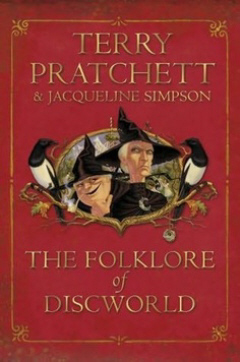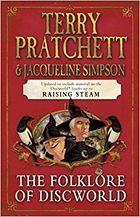Book:The Folklore of Discworld: Difference between revisions
mNo edit summary |
(Copyedit; some reorganisation and extra info; publication date updated (per Colin Smythe)) |
||
| (5 intermediate revisions by 2 users not shown) | |||
| Line 1: | Line 1: | ||
{{Book Data | {{Book Data | ||
|title=The Folklore of Discworld | |title=The Folklore of Discworld | ||
|cover=[[File:Folklore.jpg|Cover art by Paul Kidby]] | |cover=[[File:Folklore.jpg|thumb|240px|Cover art by [[Paul Kidby]]]] | ||
|coauthors=[[Jacqueline Simpson]] | |coauthors=[[Jacqueline Simpson]] | ||
|illustrator=Paul Kidby | |illustrator=Paul Kidby | ||
|date= | |date=8 September 2008 | ||
|publisher=Doubleday | |publisher=Doubleday | ||
|isbn=9780385611008 | |isbn=9780385611008 | ||
|pages=386 | |pages=386 | ||
|rrp | |rrp= | ||
|series= | |series=Reference | ||
|characters= | |characters= | ||
|annotations= | |annotations= | ||
|notes= | |notes= | ||
}} | }} | ||
'''''The Folklore of Discworld''''' is a non-fiction book discussing the Roundworld folklore that inspired or features in the Discworld novels. Unlike [[:Category:Science Series|the ''Science of Discworld'' series]], there’s no new fiction; the folklore is illustrated with excerpts from the novels, and from historical sources. | |||
== Blurb == | |||
Most of us grow up having always known to touch wood or cross our fingers, and what happens when a princess kisses a frog or a boy pulls a sword from a stone, yet sadly, some of these things are now beginning to be forgotten. Legends, myths, fairytales: our world is made up of the stories we told ourselves about where we came from and how we got there. It is the same on Discworld, except that beings that on Earth are creatures of the imagination, like [[vampires]], [[trolls]], [[witches]] and, possibly, [[gods]] are real, alive and in some cases kicking on the Disc. | Most of us grow up having always known to touch wood or cross our fingers, and what happens when a princess kisses a frog or a boy pulls a sword from a stone, yet sadly, some of these things are now beginning to be forgotten. Legends, myths, fairytales: our world is made up of the stories we told ourselves about where we came from and how we got there. It is the same on Discworld, except that beings that on Earth are creatures of the imagination, like [[vampires]], [[trolls]], [[witches]] and, possibly, [[gods]] are real, alive and in some cases kicking on the Disc. | ||
In '''''The Folklore of Discworld''''', [[Terry Pratchett]] teams up with leading British folklorist [[Jacqueline Simpson]] to give an irreverent yet illuminating look at the living myths and folklore that are reflected, celebrated and affectionately libelled in the uniquely imaginative universe of [[Discworld]]. | In '''''The Folklore of Discworld''''', [[Terry Pratchett]] teams up with leading British folklorist [[Jacqueline Simpson]] to give an irreverent yet illuminating look at the living myths and folklore that are reflected, celebrated and affectionately libelled in the uniquely imaginative universe of [[Discworld]]. | ||
==Chapters== | == Chapters == | ||
The book is divided into sixteen chapters, each of which covers a particular area of Discworld and searches out the Roundworld referents for selected Disc phenomena. | |||
# The Cosmos, Gods, Demons and Things | # The Cosmos, Gods, Demons and Things | ||
# | # Dwarfs | ||
# Elves | # The Elves | ||
# The Nac mac Feegle | # The Nac mac Feegle | ||
# Trolls | # Trolls | ||
| Line 40: | Line 41: | ||
# Death | # Death | ||
There are also introductions by both Pratchett and Simpson, a bibliography, and an index. | |||
When published in paperback in October 2009 the book was updated with an additional chapter after the index, “Notes on the folklore of {{UA}}”. A third edition was released in March 2014, with the extra chapter removed and the material on {{UA}}, along with new information drawing on {{ISWM}}, {{SN}} and {{RS}}, integrated into the existing ones, especially chapters 6, 11 and 14. This edition was the first to be published in the US. | |||
While the third edition is (so far) the final one, some special early editions of {{TSC}} contain bonus material by Dr. Simpson about the folklore behind that book. | |||
== New Discworld characters and concepts introduced == | == New Discworld characters and concepts introduced == | ||
While the discussions tend to revolve around settings, characters and concepts well established in the canon, Pratchett does offer up some brand new (or at least unfamiliar) characters and ideas from his "stack" as illustrations for Dr. Simpson's discourses. | |||
*[[Miscegenation Carter]] | *[[Miscegenation Carter]] | ||
== Gallery == | |||
{| | |||
|- | |||
| valign="top" | [[File:FOD2.jpg|thumb|140px|Updated cover]] | |||
| valign="top" | [[File:FOD3.jpg|thumb|140px|Second updated cover]] | |||
| valign="top" | [[File:FOD US.jpg|thumb|140px|US Edition]] | |||
| valign="top" | [[File:FOD Play.jpg|thumb|200px|Audio device by Playaway]] | |||
|} | |||
{{DEFAULTSORT:Folklore of Discworld,The}} | |||
[[Category:Reference | [[Category:Reference]] | ||
[[de:Buch:Mythen und Legenden der Scheibenwelt]] | [[de:Buch:Mythen und Legenden der Scheibenwelt]] | ||
Latest revision as of 12:42, 4 January 2023
| The Folklore of Discworld | |
 | |
| Co-author(s) | Jacqueline Simpson |
| Illustrator(s) | Paul Kidby |
| Publisher | Doubleday |
| Publication date | 8 September 2008 |
| ISBN | 9780385611008 |
| Pages | 386 |
| RRP | |
| Main characters | |
| Series | Reference |
| Annotations | View |
| Notes | |
| All data relates to the first UK edition. | |
The Folklore of Discworld is a non-fiction book discussing the Roundworld folklore that inspired or features in the Discworld novels. Unlike the Science of Discworld series, there’s no new fiction; the folklore is illustrated with excerpts from the novels, and from historical sources.
Blurb
Most of us grow up having always known to touch wood or cross our fingers, and what happens when a princess kisses a frog or a boy pulls a sword from a stone, yet sadly, some of these things are now beginning to be forgotten. Legends, myths, fairytales: our world is made up of the stories we told ourselves about where we came from and how we got there. It is the same on Discworld, except that beings that on Earth are creatures of the imagination, like vampires, trolls, witches and, possibly, gods are real, alive and in some cases kicking on the Disc.
In The Folklore of Discworld, Terry Pratchett teams up with leading British folklorist Jacqueline Simpson to give an irreverent yet illuminating look at the living myths and folklore that are reflected, celebrated and affectionately libelled in the uniquely imaginative universe of Discworld.
Chapters
The book is divided into sixteen chapters, each of which covers a particular area of Discworld and searches out the Roundworld referents for selected Disc phenomena.
- The Cosmos, Gods, Demons and Things
- Dwarfs
- The Elves
- The Nac mac Feegle
- Trolls
- Other Significant Races
- Beasties
- The Witches of Lancre
- The Land of Lancre
- The Witches of the Chalk
- The Chalk
- Heroes!
- Lore, Legends and Truth
- More Customs, Nautical Lore and Military Matters
- Kids Stuff... You know, about 'Orrid Murder and Blood
- Death
There are also introductions by both Pratchett and Simpson, a bibliography, and an index.
When published in paperback in October 2009 the book was updated with an additional chapter after the index, “Notes on the folklore of Unseen Academicals”. A third edition was released in March 2014, with the extra chapter removed and the material on Unseen Academicals, along with new information drawing on I Shall Wear Midnight, Snuff and Raising Steam, integrated into the existing ones, especially chapters 6, 11 and 14. This edition was the first to be published in the US.
While the third edition is (so far) the final one, some special early editions of The Shepherd's Crown contain bonus material by Dr. Simpson about the folklore behind that book.
New Discworld characters and concepts introduced
While the discussions tend to revolve around settings, characters and concepts well established in the canon, Pratchett does offer up some brand new (or at least unfamiliar) characters and ideas from his "stack" as illustrations for Dr. Simpson's discourses.
Gallery
 |
 |
 |
 |